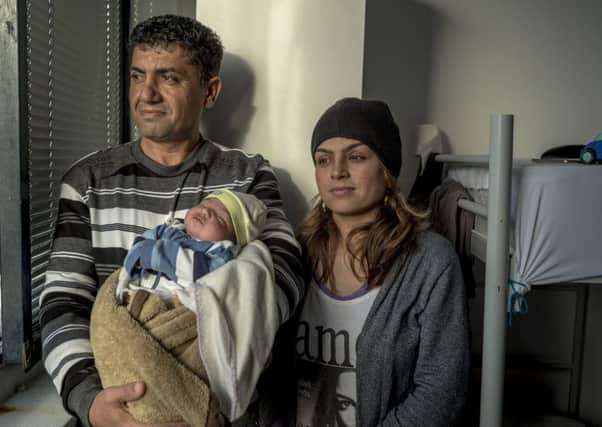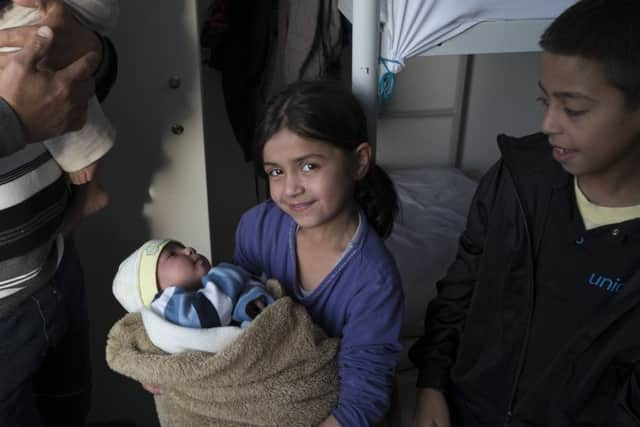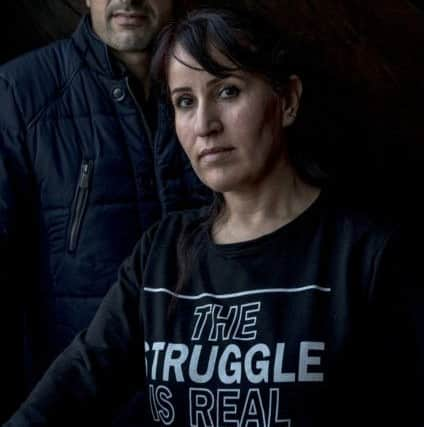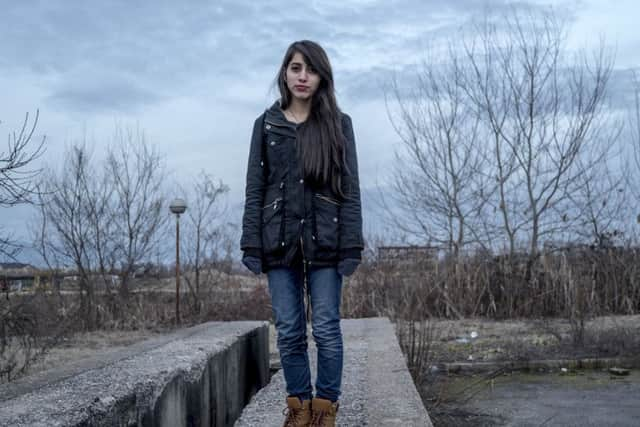Meet the families trapped in refugee camps after fleeing war


Shakila Mosanafe shows off a picture on her phone of a cityscape at night, dramatically lit with twinkling lights.“My city,” she says, her eyes filling with tears. “I want to go home. I want to go to Iraq,”
Shakila, 17, is one of around 200 refugees living in the Bujanovac camp in southern Serbia.
Advertisement
Hide AdAdvertisement
Hide AdMore than 7,300 refugees are trapped in the Balkan nation – unable to move onwards into western Europe since the border with Hungary was closed over a year ago.


She is here with her parents, 20-year-old brother and 16-year-old sister. She says she still does not understand why her family decided six months ago that they had to leave their home, where she had friends and her school life. They are protecting her from the truth, she believes.
“They know something,” she says. “I told my mother I didn’t want to go and she started crying and said: ‘I am going for you, not for myself’.”
Shakila’s father was involved in Kurdish opposition politics in Iran, where she lived until she was a toddler.
She remembers a moment during the family’s treacherous journey of almost 2,000 miles when they were packed by people smugglers into a van in the middle of a forest.


“In that moment, my dad was crying,” she remembers. “I was so scared. I was hugging my sister. That was only the second time I saw my dad cry.”
All the refugees, bar none, have been forced to pay people smugglers thousands of pounds – for most, their life’s savings – to get them to Serbia. All have stories about the horrific conditions they endured on what has become known as “the Journey” from the Middle East to the outermost borders of Europe, which involves treacherous boat trips in overcrowded dinghies and arduous hikes across mountainous regions lasting for days.
All hope they will be able to progress to claim asylum in western Europe.
Advertisement
Hide AdAdvertisement
Hide AdKhalid Mortazazata, an Iranian high school English teacher, tells of his family’s treatment at the hands of the Bulgarian mafia, who stripped him, his wife and two young children to their underwear and left them at the side of the road in freezing temperatures.


Khalid himself is no stranger to being a refugee. As a teenager, the 38-year-old university-educated Kurd had been forced to flee Iran due to his father’s involvement in the opposition PDKI party – to settle in Iraq, where he lived peacefully for the next 20 years.
He met his wife, Abdulla, and the pair had two children, Danyal, seven, and Roza, four.
Life was good for the family. Then political tensions began to increase. “They said they were against us and they would kill us,” he said. “That was when we decided to go. We did it for the kiddies.”
After paying smugglers $11,500 (£9,000), the family travelled across the Middle East.


But it was in Bulgaria – a member nation of the European Union – that they ran into the worst problems. Smugglers packed them into a minivan to transport them to the Serbian border but less than half an hour later they were caught by the local mafia – who he believes was working with some of the smugglers – and stripped to their underwear.
“They took the clothes from all of the children, men and women,” he remembers. “They took everything. Our mobiles, clothes, shoes and bags.
“One of them wanted to put his hand on the breast of my wife – they were searching for money and mobiles. But my wife reacted to them and they broke her hand.
Advertisement
Hide AdAdvertisement
Hide Ad“They had a gun which they put to the head of each of us. They had knives. They said: ‘If you do anything we will kill you’.
“To save our kids, we said we wouldn’t do anything. That night we spent without clothes, just underwear. It was very cold, it was September.”
He adds: “It was one of the most terrible nights in my life. The children were crying and shaking in the cold weather. When I remember that night, I never wish that it happened in anybody’s life, not just me.”


Eventually a smuggler in Sofia sent a car to pick them up and they later continued their journey to the Serbian border, where they were picked up by local police.
“The police were very kind,” he says.
He still believes that leaving Iraq was the right – and only – decision.“I just want to be safe,” says Khalid simply. “I had no economic problems in Iraq.” He has a certificate from the United Nations’ refugee arm, UNCHR, instructing that he should be “protected from forcible return” to a country where he could be in danger.
His sister is settled in Germany and his brother lives in London. Both left years before the refugee crisis began in earnest and were able to straight- forwardly claim asylum in Europe due to their father’s political history.
Yet, like the thousands of other refugees in Serbia, Khalid has to wait his turn for his number to be called to the Hungarian border, where only a handful of refugees a day are being allowed through. Even some of those who are granted the chance of an interview with border officials are still turned back.
“We can live our lives normally here,” he says of the camp where he is a community leader and has started teaching English to other residents. “It is good. But it is not our aim to spend our lives here [in a refugee camp]. We don’t complain about our situation but it is not what we want.”
Advertisement
Hide AdAdvertisement
Hide AdSince we met, Khalid has travelled again – smuggling his family over the border to Romania, where he is now in a camp near the northern city of Baia Mare – and hopes that the fact the country is an EU nation will allow him to eventually be granted permission to travel on to Germany, to allow him to live with his sister.
“It is better here,” he says. “In Serbia, it was like we were in prison because we could not move around, but here we can visit other cities.”
Refugees living at the Bujanovac camp are lucky: most families have their own room, packed tightly with bunk-beds. Food is provided on a regular basis in a canteen by staff from a local organisation, Philanthropy, a project which is funded by the UK charity Christian Aid. The sense of community at this camp is strong. The children play happily together as they wait for food to be served and the women chat. A toddler is being looked after by other residents after her mother was admitted to hospital following complications relating to the birth of her second child.
Over dinner, Mohammed Ismail Omeri, 43, a perpetually smiling shopkeeper from Kabul who led his seven children and pregnant wife to Serbia from Afghanistan, introduces his ten-year-old daughter who has barely spoken since the family left their home, where Mohammed says he was robbed every day on his way back from work. The noise of bomb blasts and fear of Taleban attacks in their home town has left the child unable to do much else other than cry, he says.
His wife, Shamim, 36, who has given birth to their eighth child since arriving at Bujanovac, is also badly affected.
“My wife has lost her memory sometimes,” he says. “She has seen a lot of bad things and sometimes she doesn’t know where she is.”
Their journey included a two-day stay in prison on the Iraq-Turkey border, during which he lost touch with his wife and children.
“I was thrown in the water [by police] and it was after that that I finally found my family,” he says.
Advertisement
Hide AdAdvertisement
Hide AdWell aware of the risks involved in continuing the journey, Mohammed focused on getting his family to Europe, where he hopes they will be cared for, no matter what happens to him. He says the most terrifying moment was when the people smugglers packed his family into a small overcrowded boat.
“It was when I was sitting on that small boat with 50 people that I was scared,” he says. “I was thinking that I would die here on this boat, that we would all die.”
But he was not deterred.
“I thought I will start my journey and go to my destination,” he says. “It is better that I die like that. If I die there, what would happen to my children, who would take care of them?”
• As Christian Aid marks 60 years of Christian Aid Week, the organisation is inviting people to join them in standing in solidarity with refugees around the world. The charity has been working with refugees since the Second World War.
You could help to change the lives of people fleeing conflict and crisis this Christian Aid Week by donating online at www.caweek.org calling 08080 006 006, or texting ‘GIVE’ to 70040 to give £5.
Short term solution becomes home for the stranded
Presevo camp, on the edge of a small border town in southern Serbia, has been transformed over the past year.
Created on the site of a former factory in response to the thousands of refugees passing through the country en route to Germany, the Serbian government and aid agencies established the base as a “one stop centre” or transit camp.
Refugees previously stopped here briefly, were given a change of clothes and a meal and perhaps spent the night, and then were sent on their way along the so-called “West Balkan Route” on specially-chartered buses and trains.
Advertisement
Hide AdAdvertisement
Hide AdBy February 2016, when I first visited the camp, a couple of UNHCR tents had been erected to house the refugees in army-style bunks, while the Danish government had just paid for the refurbishment of some former offices to turn them into dormitories, complete with bunk beds and bathroom facilities – at that point, the facility was still to be opened.
But in March last year, everything changed. Countries surrounding Serbia closed their borders to refugees, meaning thousands became trapped within the former Yugoslavian nation, which is not yet in the European Union.
The Presevo camp and others like it around Serbia quickly became permanent settlements – housing more and more refugees travelling illegally over the border from Bulgaria.
Now, the temporary dormitories have become permanent homes. Some refugee families have lived here for more than a year. Families sleep in double bunk beds – dozens of them to a room – many of which have been cordoned off in an attempt at privacy by hanging blankets or sheets between the bunks.
Plastic carrier bags containing perishable food items hang from the windows in place of a fridge.
Permanent structures such as a shiny play park for the children in the camp have been erected, while a doctor’s surgery manned by local Serbian health centre staff treats around 140 patients every day.
At both Presevo and a camp just 16 miles away in Bujanovac, social and educational activities are on offer, organised by charities and non-governmental organisations to keep the refugees occupied.
In one building at the back of the Presevo site, refugees are learning German, while a poster advertises “Gymnastics for Women” and “Drawing and Ping Pong for Men”.
Advertisement
Hide AdAdvertisement
Hide Ad“Ich kaufe Gemuse”, the refugees are repeating in their German lesson – “I buy vegetables”.
At Bujanovac, around 16 miles north, educational activities for children are tightly scheduled – from “psychomotor learning activities” such as drawing, painting and playing with clay for younger children, to computer-related activities for teenagers.
In an effort to help the refugees – many of them naturally opposing communities on home ground – live together harmoniously, activities even involve Kurdish lessons, taught by a refugee, and cultural awareness events.
“Occupational activities were planned for certain number of people, but interest was so huge that we had to make several groups,” says Dragana Levicanin, project co-ordinator at Serbian NGO Philanthropy, which runs projects funded by UK charity Christian Aid.
“People want to be busy. In Serbia we have a quote: ‘Idle brain – devil’s playground.’
“Once they start with some everyday activities, people get back to calm thoughts, their focus is not on their current status, but rather on something they made, finished, or produced.”